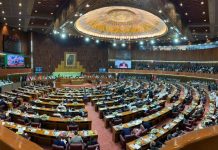UNITED NATIONS: Pakistan has reiterated its commitment to control HIV/AIDS epidemic at the UN General Assembly. It has also announced a strong national and provincial support for the prevention, treatment and care of the virus, in addition to reducing stigma and discrimination, attached to it.
In his address to the 193-member assembly, convened at a high-level plenary meeting on ending AIDS, Darshan Punchi, Parliamentary Secretary for National Health Services, said that Pakistan’s national response to HIV prevention and treatment was backed by the government’s firm political commitment, and guided by its strategy to control the epidemic by 2030.
The plan, he said, emphasises targeted, evidence-based and quality-assured interventions, which would produce a high impact in high-risk groups. It was based on a coordinated and multi-sectoral approach to target all its drivers and consequences, he added.
Pakistan, he said, had a low HIV prevalence— below 1 per cent. Yet, the prevalence among the injection drug users was 27.2 per cent. Ending the HIV/AIDS and alleviating poverty are the programmes, which must be supported by international cooperation, Punchi said.
Scientific breakthroughs and lessons learned from scaling up the AIDS response had now provided the tools to end AIDS by 2030. In this regard, the Pakistan delegate welcomed the valuable support of international partners, which included UNAIDS and other UN agencies, as well as the relevant NGOs and civil society organisations.
“The Government of Pakistan is aware that in next five years, we have a narrow window of opportunity to radically change the trajectory of the HIV epidemic; and we will utilize this opportunity to fill the gap between estimated and registered number of patients by achieving three 90s target set out in the 2016 Declaration,” he noted.














